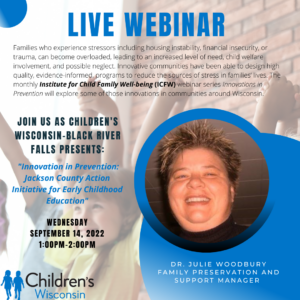September 14, 2022
 Accessible, affordable and high-quality early childhood education (ECE) can contribute to cognitive, emotional and social development in children helping them grow into thriving, contributing adults. For parents and caregivers, ECE provides them with the opportunity for gainful employment, economic stability and self-sufficiency. The Jackson County Childcare Network (JCCN) identified Jackson County as an early childhood education desert, with capacity to only serve 278 children of the estimated 1000+ children in need of care. This disparity has resulted in an estimated $2.5 million loss in work productivity, parents unable to work to their full capacity, while 17.8% of children in the county live in poverty. The stressful conditions and circumstances associated with the lack of ECE options, un/under-employment, the effects of poverty, and toxic stress all are risk factors for poor child health outcomes, including increased risk for experiencing neglect.
Accessible, affordable and high-quality early childhood education (ECE) can contribute to cognitive, emotional and social development in children helping them grow into thriving, contributing adults. For parents and caregivers, ECE provides them with the opportunity for gainful employment, economic stability and self-sufficiency. The Jackson County Childcare Network (JCCN) identified Jackson County as an early childhood education desert, with capacity to only serve 278 children of the estimated 1000+ children in need of care. This disparity has resulted in an estimated $2.5 million loss in work productivity, parents unable to work to their full capacity, while 17.8% of children in the county live in poverty. The stressful conditions and circumstances associated with the lack of ECE options, un/under-employment, the effects of poverty, and toxic stress all are risk factors for poor child health outcomes, including increased risk for experiencing neglect.
In 2021, the Jackson County Action Initiative (JCAI) was formed to engage the local community to address the ECE crisis in Jackson County and enhance protective factors for families to mitigate negative outcomes and support family well-being. To achieve these goals and address this complex challenge, the JCAI is using a collective impact approach. Collective impact is a network of community members, organizations, and institutions who advance equity by learning together, aligning, and integrating their actions to achieve population and systems level change. In this webinar, you’ll learn about:
- The importance of early child education in supporting child, family, and community health and prosperity.
- Challenges around insufficient early childhood education facing rural communities.
- Core principles from the Collective Impact model and how the JCAI is applying them.
- Early lessons learned from this ongoing effort.
Watch the webinar recording here

